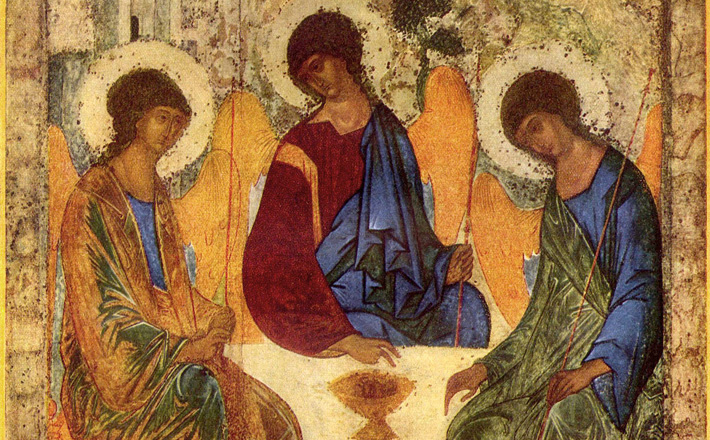Commentary on 2 Corinthians 13:11-13
The final remarks in 2 Corinthians encapsulate Paul’s advice in this letter and highlight the grace of the Lord Jesus Christ, the love of God, and the fellowship of the Holy Spirit that make “new creation” possible (2 Corinthians 5:17).1
On this Sunday that celebrates the mystery of the Holy Trinity, Paul’s final words to the Corinthians underscore the church’s reliance on the power of the divine for hope of its transformation.
Paul’s closing remarks in 2 Corinthians include stern admonition and loving exhortation. It is, perhaps, fitting that 2 Corinthians should close with both warning and with love. Paul’s emotions have been bubbling close to the surface throughout this text. In the beginning of 2 Corinthians, he recalls both a painful visit and a tearful letter (1:15-2:4). In 2 Corinthians 7, he has learned good news from Titus, and his joy for the church is not concealed (7:5-16).
In chapter 10, however, the tone of the letter changes to a defense against the teachings of the so-called “super apostles” (11:5, 11). As the letter draws to a close, Paul is still stung by the charges of his opponents and the Corinthians’ failure to commend him (12:11). He warns that a third visit will be a painful time of mourning over those who continue to harm the community. By now the vices that he lists are no surprise—“quarreling, jealously, anger, selfishness, slander, gossip, conceit, and disorder” (12:20).
First Church Corinth is a community torn by factions. In fact, the Corinthians’ divisiveness has taken center stage since the first canonical letter. In 1 Corinthians 1:10, the apostle writes, “Now I appeal to you, brothers and sisters, by the name of our Lord Jesus Christ, that all of you be in agreement and that there be no divisions among you, but that you be united (katertismenoi) in the same mind and the same purpose.” In the closing of 2 Corinthians, the apostle expresses the same wish: “mend (katartizesthe) your ways,” “agree with one another,” and “live in peace” (13:11).
For Paul, agreeing with one another or, more literally, thinking the same way should not be read as an appeal to uniformity. The apostle has recognized and has applauded the diversity of this congregation (1 Corinthians 12:12-27). Rather, this appeal to think the same way is an appeal to think “according to Christ Jesus” (Romans 15:5) or to have the same mind as Christ when he voluntarily humbled himself and died for the sake of the world (Philippians 2:5-11). Having that kind of love for another will facilitate living at peace and mending the factions that have torn this congregation.
That kind of love, however, is not possible without the power of God’s Holy Spirit at work in the congregation. Paul’s exhortations urge the Corinthians to demonstrate fruit of the Spirit—particularly joy and peace. In verse 11, what the NSRV translates as “farewell” is more literally “rejoice.” Paul uses the verb in a similar way in Philippians 4:4 where he calls the Philippians to rejoice always. This rejoicing is modeled for the church by Paul’s own rejoicing throughout Philippians as he recounts his joy even in the midst of his present distress (Philippians 4:10-13). Joy is only possible because of the believers’ citizenship in heaven (Philippians 3:20). Joy is a marker of God’s kingdom.
Likewise, the appeal to peace is also a marker of the Spirit’s work (5:22). The mind that is set on the Spirit is a mind that knows peace (Romans 8:6). Those who are justified have peace with God (Romans 5:1). Living peaceably should be a marker of the church (Romans 12:18; 14:19; 1 Thessalonians 5:13), since God calls the saints to peace (1 Corinthians 7:15) and God is a God of peace (1 Corinthians 14:33; Phil 4:7, 9; 1 Thessalonians 5:23).
In short, the presence of joy and peace are the indicators of the Spirit’s transformative work to reveal God’s kingdom: “For the kingdom of God is not food and drink but righteousness and peace and joy in the Holy Spirit” (Romans 14:17). Paul’s closing in 2 Corinthians is not simply an appeal for the church to get along, it is an exhortation for the Corinthians to be the new creation that the Spirit is equipping them to be.
Greeting one another with a holy kiss is a tangible way to show love and fellowship in this community of folks who are still struggling to love one another and who are still learning how to be Christ’s body in their world. This exhortation is common in Paul’s letters, as is the reminder that there are other saints elsewhere who send their love.
The final remarks include one last reminder of the theological bedrock that makes the church’s existence possible. The trinitarian framework of 2 Corinthians 13:14 is striking: “The grace of the Lord Jesus Christ, the love of God, and the fellowship of the Holy Spirit be with you all.” At the time of this letter, the doctrine of the trinity had not yet been fully articulated, yet here we find a reference to all three persons.
The mention of God, the Lord Jesus Christ, and the Holy Spirit in one breath, however, should not be surprising to any reader of Paul’s letters. Paul has already claimed that the Corinthians have but “one Lord and one God” (1 Corinthians 8:6). Furthermore, it is the Spirit who has come from God (1 Corinthians 2:12) who enables the church to have the “mind of Christ” (1 Corinthians 2:16). Of course, it is only through the grace of Christ that the church enjoys fellowship with the Spirit.
This final appeal for the presence of Christ’s grace, God’s love, and the Spirit’s fellowship bears witness to the divine power that has created and sustained both the Corinthian church and the church today. God is the very source of our life in Christ Jesus, and in Christ we are a new creation.
Notes
- Commentary first published on this site on June 15, 2014.


June 7, 2020